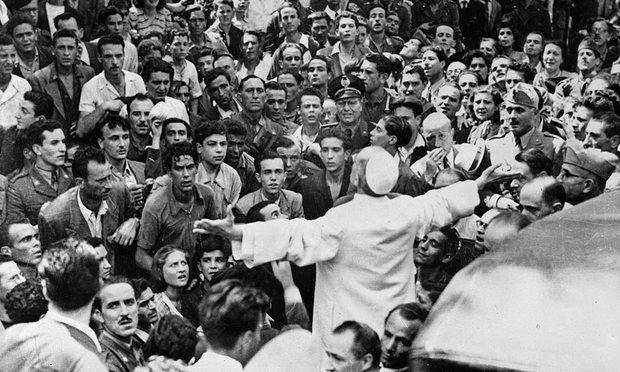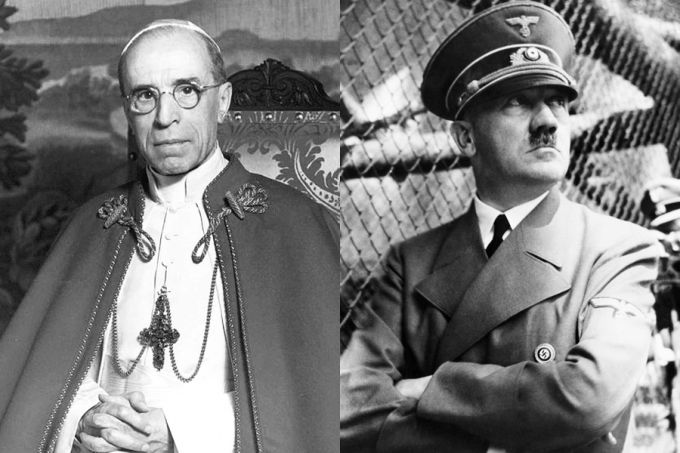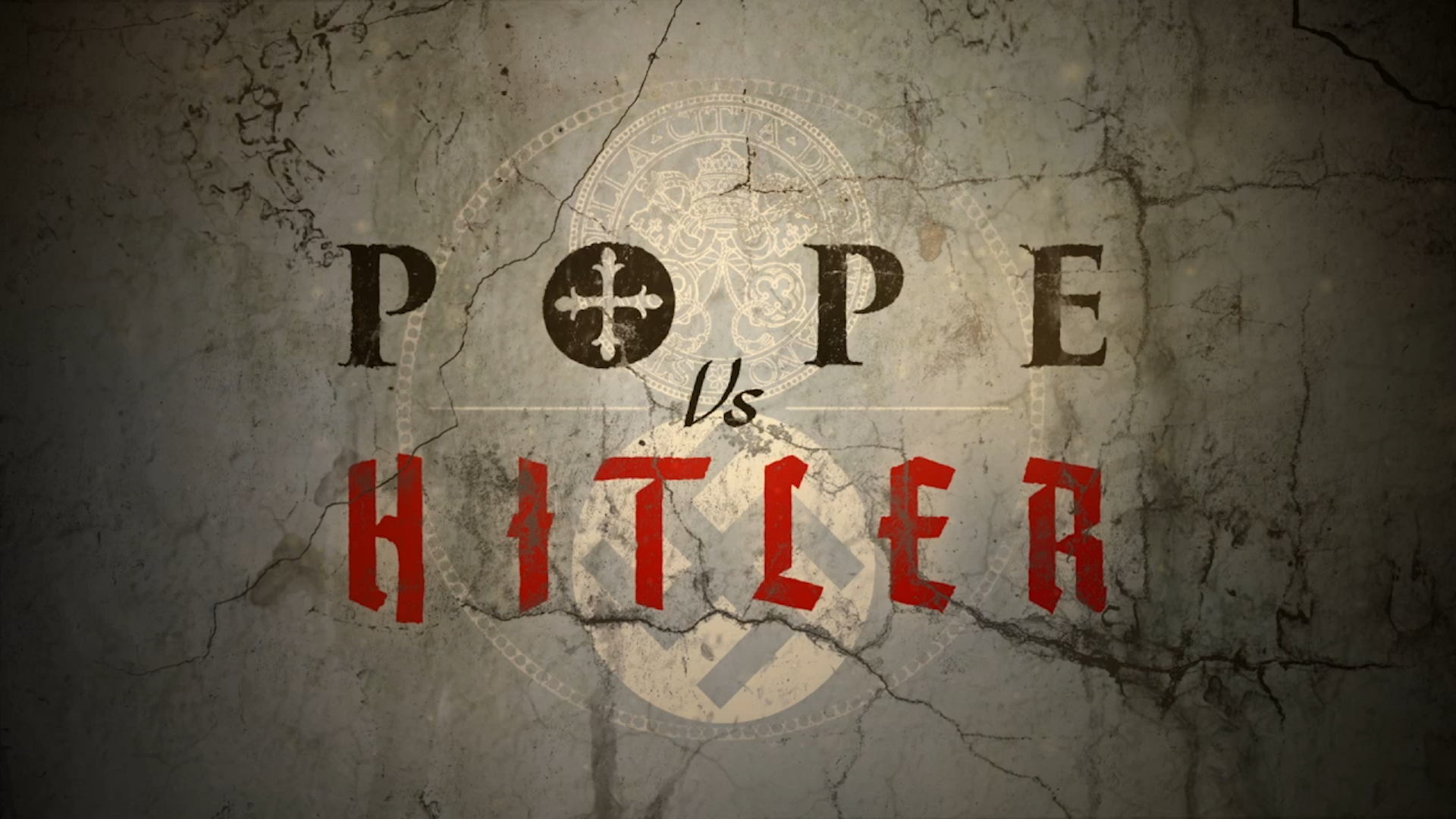What did Pius XII know about the Nazi regime in Germany, and did he do enough to undermine it? Did he do enough to save Jews from slaughter by the Nazis – in Rome and throughout Europe? These and other questions remain open – but some might be answered if Pope Francis were to take action.
National Geographic Channel (NatGeoTV to its friends) has released, “Pope vs. Hitler,” a new “docudrama” about the loggerheads between Pius and Adolf Hitler. The film deploys at least a dozen fine historians to tell the tale, principal among them is Mark Riebling, author of Church of Spies. Also included in the film are such estimable experts as Father George W. Rutler, Eric Metaxas, and Nigel Jones. I’d name them all – and several others will receive mention – but best to get on with the review.
In answer to the first question above: the pope knew plenty. As “Pope vs. Hitler” shows, Pius XII sought to undermine the Nazi regime from the beginning. And even before, in that he was, as Vatican Secretary of State, the main author of Mit brennender Sorge (“With Burning Concern,” 1937), the only encyclical (under Pius XI’s name) not originally published in Latin. It was a strong condemnation of the Nazis’ attacks on the Church and on German Jewish converts to the Church. It had nothing to say about the German regime’s dispossession, deportation, and detainment of Jews. (The first of the death camps became operational in 1939.)
There was an early plot against Hitler’s life undertaken by elements of the Abwehr, the intelligence division of the German army. To this, Pius XII gave his support. The plot fizzled, after which the pope’s actions in that regard became more circumspect. Indeed, every one of the noble conspiracies against Hitler failed.
As Nigel Jones says: “It’s almost as if the devil was on Hitler’s side.”
Well. . .yes.
Before, during, and after the war, the Papa Pacelli was advised that forceful interventions on his part would likely increase already severe restrictions on the Church and on Catholics in countries occupied by German forces.
A docudrama, of course, mixes archival film, talking heads, and dramatic reenactments of historical events. And this is a very effective example of the genre. It is also, by my reckoning, mostly positive in its judgment of Pius. But not wholly so. The estimable Rabbi Shmuley Boteach says early on that among historians the “consensus” is that the Shoah (the Holocaust) “couldn’t have happened” to the extent it did had the pope forcefully condemned the Nazi Final Solution. British historian Geoffrey Robertson agrees with the rabbi: “The pope’s condemnation would have resounded around the world.”
No doubt that’s true, although if you visit the U.S. Holocaust Museum in Washington, D.C., you’ll learn that reports of Nazi crimes were often discounted or ignored – by the New York Times and by the Roosevelt Administration.
A substantial portion of “Pope vs. Hitler” deals with those failed plots against der Führer, which is interesting history, although awfully well known. This is especially true of the last and most famous assassination attempt, code name Valkyrie, undertaken by COL Claus von Stauffenberg on July 20, 1944. It nearly succeeded. Stauffenberg was probably a devout Catholic (historians debate it), but in the event, he received nothing by way of assistance or encouragement from the Vatican. So why is it in the film?

Perhaps because the night before he placed a briefcase bomb near Hitler, Stauffenberg went to Confession and, according to Mr. Riebling, asked for and received “St. Leo’s Absolution.” It’s the first I’ve heard of it: forgiveness of sins ahead of battle sometimes given to soldiers.
From all this, it seems clear that Pius XII was hardly “Hitler’s pope,” as he has sometimes been styled.
Still, this brings us to question No.2: Did the pope do enough to save Jews from slaughter? Rabbi Boteach acknowledges that the pope hid Jews when he could – in monasteries and catacombs – but when many hundreds of Roman Jews were rounded up and put on trains for death camps (a mere handful survived), the pope did nothing. Had Pius gone to the station and told the German soldiers – some of whom were surely Catholic – that they were engaged in a mortal sin, what might have been the consequence?
Well, this is the problem, isn’t it? Actions in history are either taken or not taken, and we can only truly judge what actually happened; not what might have been.

And this brings us to my plea: Pope Francis, please throw wide open all the archival material related to the wartime papacy of your venerable predecessor Eugenio Pacelli.
I have spent several years in the Archives of the Archdiocese of New York doing research for a book (more about that in future columns) and understand why archival material must remain sealed for a certain period. Julian Assange of WikiLeaks wouldn’t agree because he has an absolutist view that the truth must never be concealed. Of course, that’s nonsense – and not just concerning top-secret information.
My co-author (Mr. Marlin) and I were unable, for instance, to see anything from the Archdiocese’s many files on John Cardinal O’Connor, who died in 2000. This is because there may be statements in the files about living individuals that are libelous or untrue or both. So the rule is: wait 25 years. It’s my understanding that the Vatican waits 75 years.
This would justify holding back the papal archives of Pius XII, who died in 1958, until 2033. But why not release some documents now (through at least 1940) and the rest of the war years in 2020? It would help put many questions to rest, something the Church should want to do as soon as possible.















